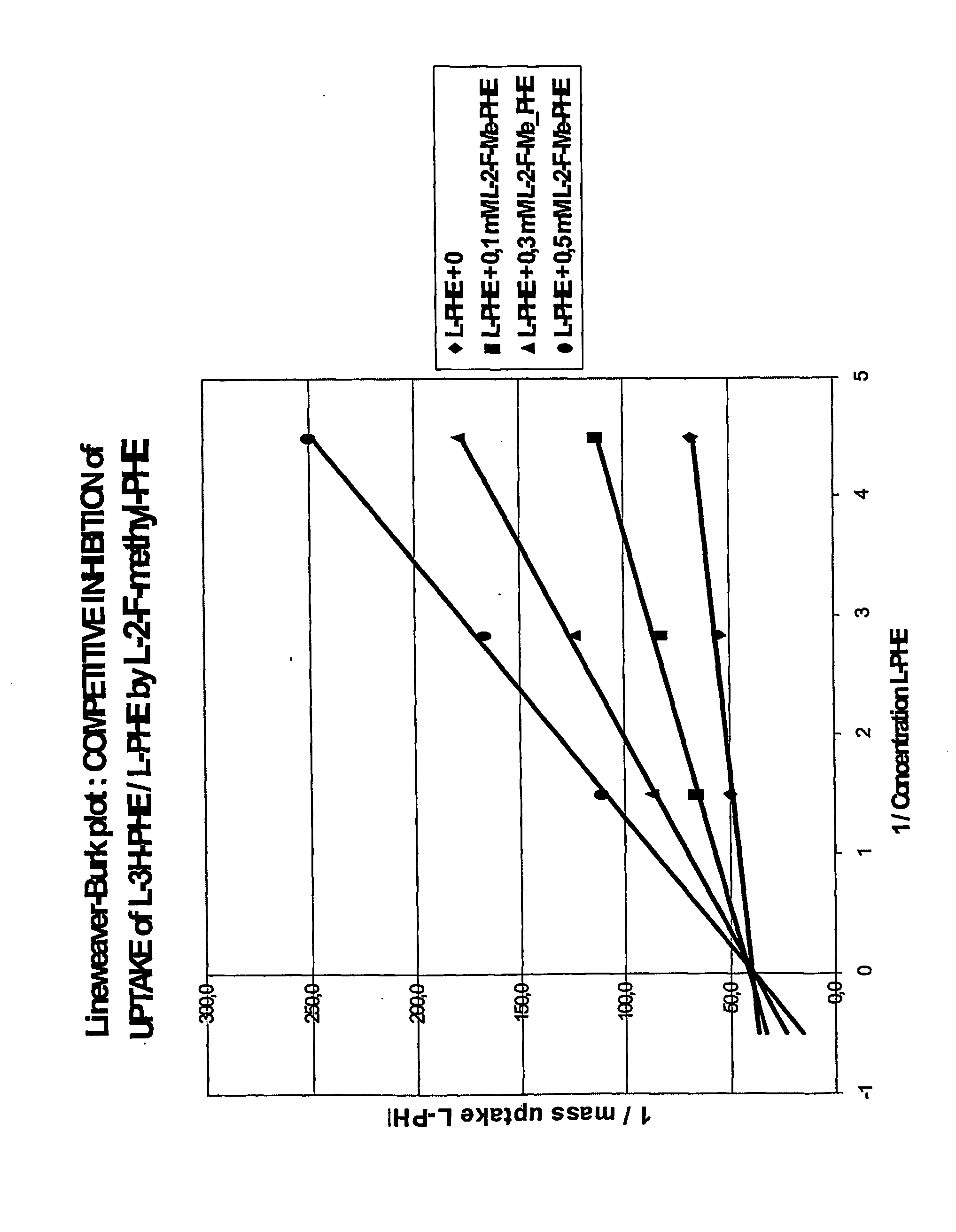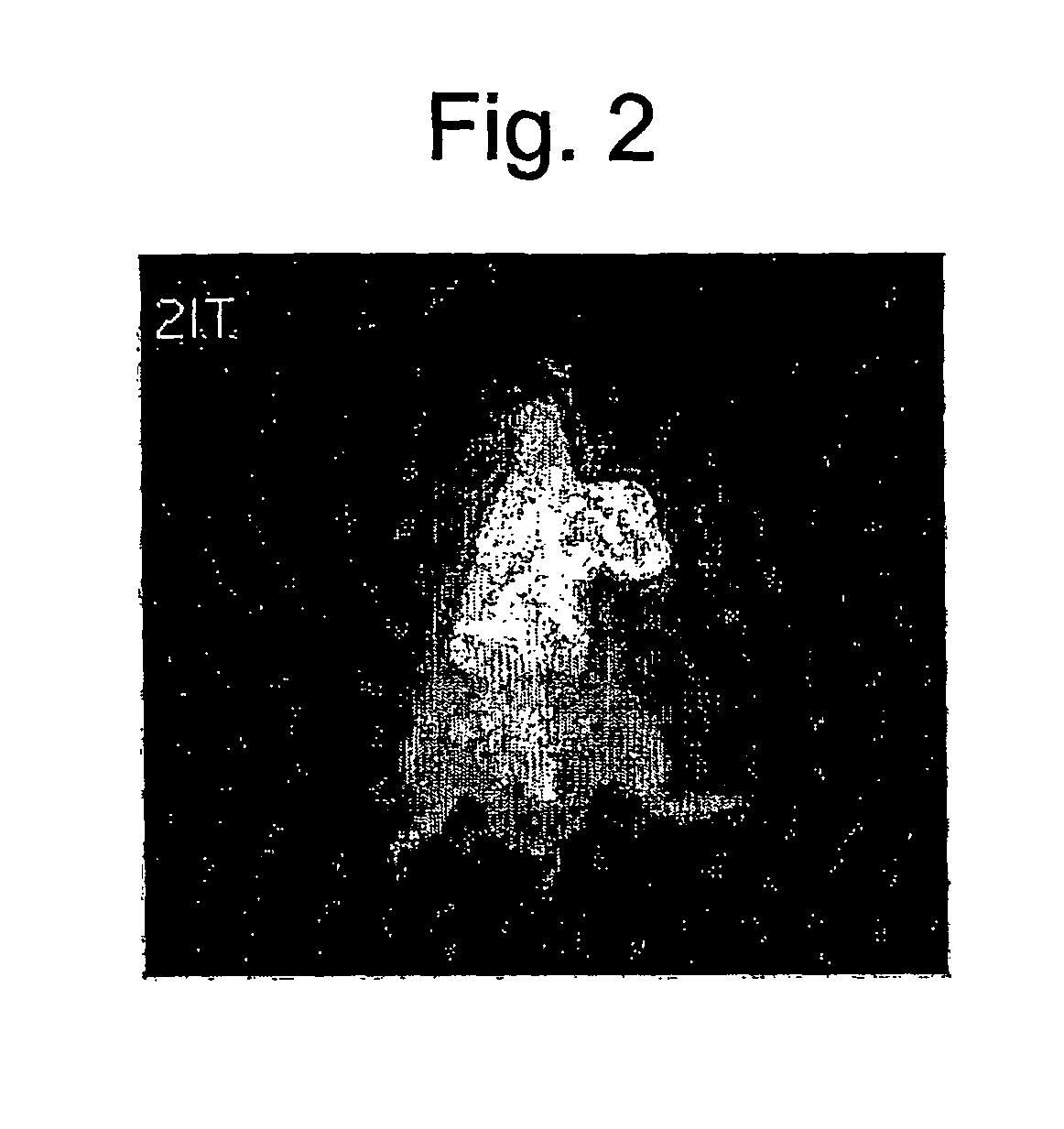Radioactively labelled amino acid analogues, their preparation and use
- Summary
- Abstract
- Description
- Claims
- Application Information
AI Technical Summary
Benefits of technology
Problems solved by technology
Method used
Image
Examples
example 1
Synthesis of Precursor Molecules and Non-Radioactive Fluorinated Analogues.
1.1. Protected L-2-bromomethyl-PHE
[0037] On L-2-methyl-Phe the tributyl ester and N-Boc protection is introduced by conventional chemistry (N-Boc: (BOC)2O, TEA, MeOH / tButOH, room temperature, 2 hours; Butylester: TMSL+tButOH or Li—O-t-butyl, room temperature, 24 hours). The protected compound is reacted in CCl4 with Br-succinimide in the presence of benzoylperoxide as catalyst (radical halogenation) at 80 EC during 1 hour. After precipitation of the suuccinimide the product is purified by column chromatography.
[0038] As alternative for benzoylperoxide an irradiated polymer like PMMA is used as radical promotor, this allows the purification by simple filtration.
1.2. Protected L-2-Tosethyl-Phe
[0039] L-2-I-Phe is obtained by Cu1+ assisted iodo for bromo exchange on commercial available L-2-Br-Phe in acidic reducing aqueous condition (gentisic acid and SnSO4 as reducing agent for CuSO4). Protection is int...
example 2
Radiochemical Synthesis of Compounds of the Invention
[0044] L- / D-18F—R-Phe analogues (R=methyl or ethyl) are prepared by nucleophilic exchange of 18F on L- / D-2-TosR-Phe in an AcN / TBA / HCO3− or AcN / K222 / CO32− mixture at 85 EC during 5 minutes.
[0045] In short, 18F- is separated from the target water via an anion exchange column. Elution of the activity is achieved with tetra-n-butyl ammonium hydrogenc arbonate in H2O. H2O is discarded by azeotropic distillation after addition of acetonitrile. L-2-Tosethyl-N-trityl-phenylalanine tert. butylester in dry acetonitrile is added to the 18F-recipient and heated during 3-5 minutes at 85 EC. After the reaction the solvent is evaporated by means of pre-heated N2.
[0046] Then, two pathways are possible. First, de-esterification and de-protection are preformed in solution followed by HPLC or mini-column purification. Alternatively, straightforward de-protection can be performed on a mini-column followed by HPLC or another type mini-column purif...
example 3
In Vitro Affinity for Cancer Cells
[0048] The affinity of L-2-F-methyl-phenylalanine for uptake by the L-transport system 1 (LAT1) in cancer cells (rat rhabdomyo-sarcoma cells) was determined by measuring the inhibition of the uptake of L-3H-phenylalanine after 15 minutes incubation in HEPES buffer of pH 7.4 containing appropriate amounts of L-phenylalanine and of L-2-F-methyl-phenylalanine. The uptake was saturable and followed the typical Michaelis-Menten relation allowing to draw Lineweaver-Burk (FIG. 1) plots.
[0049] The double reciprocal plots in FIG. 1 with a common intercept almost on the 1 / uptake axis shows that the inhibition is competitive with the phenylalanine uptake and uses the same LAT transporter system.
[0050] A mean Ki value of 76 :M was obtained for L-2-F-methyl-phenylalanine. This value is almost comparable with the Km value of 65 :M obtained for the natural L-phenylalanine in the same conditions.
PUM
| Property | Measurement | Unit |
|---|---|---|
| Capacitance | aaaaa | aaaaa |
Abstract
Description
Claims
Application Information
 Login to View More
Login to View More - R&D
- Intellectual Property
- Life Sciences
- Materials
- Tech Scout
- Unparalleled Data Quality
- Higher Quality Content
- 60% Fewer Hallucinations
Browse by: Latest US Patents, China's latest patents, Technical Efficacy Thesaurus, Application Domain, Technology Topic, Popular Technical Reports.
© 2025 PatSnap. All rights reserved.Legal|Privacy policy|Modern Slavery Act Transparency Statement|Sitemap|About US| Contact US: help@patsnap.com



